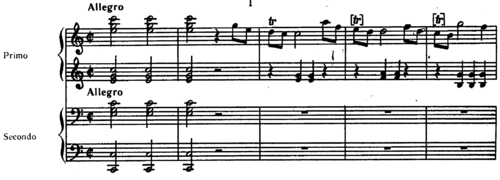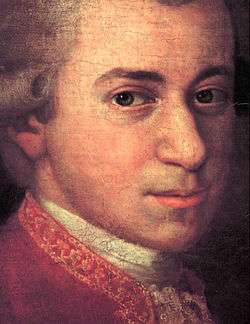Sonata in C major for keyboard four-hands, K. 19d
The Sonata in C major, K. 19d, is a work for piano four-hands once thought to be by composed by Wolfgang Amadeus Mozart in 1765 when he was nine years old. Composed in the traditional sonata form, it is one of the very few works thought to be written by Mozart for four-handed play.

Form
The sonata consists of three movements:
Allegro moderato
The first movement, 107 bars long and in common time, begins with a strong triple-playing of a C major chord. In typical sonata form, the work presents its main theme, and develops upon it. Toward the middle section (bar 40), the work drops down in tone to a darker, more ominous version of the main theme, before picking back up to the light C major chord.
Menuetto and Trio
The second movement is 54 bars long and in 3/4 time, sounding very much like an andante. The opening minuet consists of 26 bars before transitioning to a trio, lasting a mere eight bars, which repeats and then closes with the finished minuet. It is written in a very typical 18th-century minuet fashion.
Rondo: Allegretto
The final movement, 181 bars long and in 2/4 time, begins with a modulating chord phrase that is as much joyful as it is exciting. It can almost be likened to that of the final theme of Mozart's own "Gran Partita", K. 370a – 7. Finale. At bar 142, the movement switches from an ever exciting allegretto, to a slow adagio in 3/4 time lasting for 19 bars, before finally switching back to the rondo's main theme in 2/4 time at an allegro. The movement is in a standard sonata rondo form.
Authenticity
Discovered in 1921, the two printed versions of the work that have been found were found in Paris and London, both of them being dated to sometime in 1789. It was possibly composed during the Mozarts' London tour in 1765. On 13 May 1765, Mozart and his sister, Nannerl, reportedly played an authentic original Mozart composition on a two-manual harpsichord in Hickford's Great Room, Brewer Street, with reports such as "the two children will play together on the same harpsichord, and put upon it a handkerchief, without seeing the keys".[1] It is possible that Nannerl was once in possession of this and another four-hand sonata, but both are now lost.
Since there is no other known clavier four-hand work dated to this time, this work, K. 19d, was generally accepted as authentic and put into the catalogue for Mozart's works. Recently the authenticity of the work has been disputed, with the general consensus of most scholars being that the work was, in fact, not written by Mozart. Since 1993, the Neue Mozart-Ausgabe has removed the piece for the authentic section of "Keyboard music" to "Works of Spurious or Doubtful Authenticity". Theories amongst scholars suggest that the work is one possibly by another of the Mozarts during their London tour, such as Leopold or even Nannerl. An interesting point toward the work's possible authenticity is the fact that writings for both right and left hand in the score occasionally collide with one another. This strongly suggests that the original work was composed specifically for the aforementioned two-manual harpsichord. However, it is likely that the Mozarts did not play four-hand sonatas at this time, but rather, they performed four-hand concertos for keyboard instead.[1]
References
- Notes
- 1 2 Abert, Spencer & Eisen 2007, p. 44
- Sources
- Abert, Hermann; Spencer, Stewart; Eisen, Cliff (2007). W. A. Mozart. New Haven, Connecticut: Yale University Press. ISBN 9780300072235.
- (German) Franz Giegling, Wolfgang Plath and Wolfgang Rehm. Neue Mozart-Ausgabe, Series X (Supplement), Workgroup 29: "III. Klaviermusik" in Works of Doubtful Authenticity, Volume 2. Bärenreiter, 1993. Preface by Wolfgang Plath and Wolfgang Rehm.
- Zaslaw, Neal; Cowdery, William (1990). The Compleat Mozart: A Guide to the Musical Works of Wolfgang Amadeus Mozart. New York: Mozart Bicentennial at Lincoln Center. ISBN 9780393028867.
External links
- Sonata in C for keyboard four-hands: Score and critical report (German) in the Neue Mozart-Ausgabe
- Sonata for Piano Four-Hands in C major, K. 19d: Scores at the International Music Score Library Project
- Sonata for Harpsichord Four Hands in C major, K. 19d on YouTube, Andreina Di Girolamo and Silvia Rambaldi
